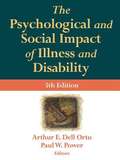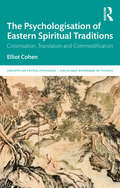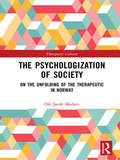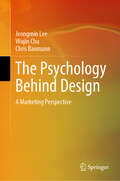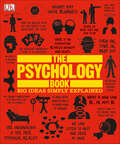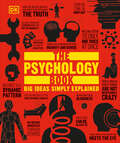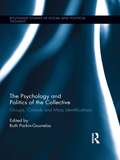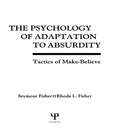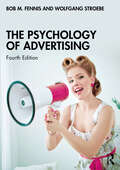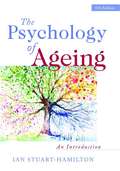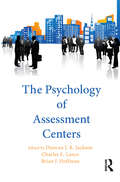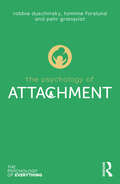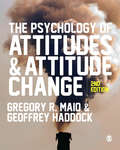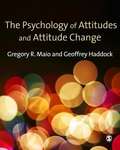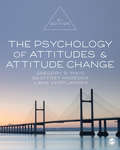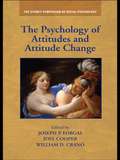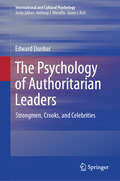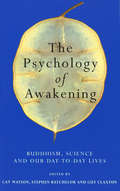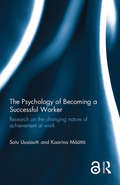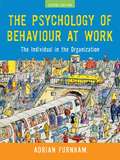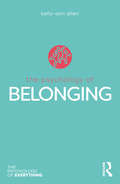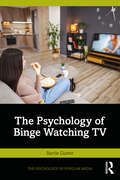- Table View
- List View
The Psychological and Social Impact of Illness and Disability (5th Edition)
by Paul W. Power Arthur E. Dell OrtoThis collection, which defines disability very broadly to include post-traumatic stress and normal aging, includes classic articles and discussion questions as well as new material on illness. With a few exceptions it concentrates on the needs of caregivers and those who seek to rehabilitate people with disabilities. Therefore articles cover such issues as definitions of disability and current or past models, shifts in expectations of care demanded by the disabled, perceptions of stages of adjustment to disability, differences in the experience of men and women, the difficulties in discerning the quality of life from outside disability, sexuality, methods of intervention and treatment to promote acceptance o a disability, family issues surrounding life and death, special resources such as assistive technology and spirituality, new applications of eugenics and euthanasia, and "quality aging." Includes exercises and narratives about disability, primarily by caregivers.
The Psychologisation of Eastern Spiritual Traditions: Colonisation, Translation and Commodification (Concepts for Critical Psychology)
by Elliot CohenThis essential book critically examines the various ways in which Eastern spiritual traditions have been typically stripped of their spiritual roots, content and context, to be more readily assimilated into secular Western frames of Psychology. Beginning with the colonial histories of Empire, the author draws from the 1960s Counterculture and the subsequent romanticising and idealising of the East. Cohen explores how Hindu, Buddhist and Daoist traditions have been gradually transformed into forms of Psychology, Psychotherapy and Self-Help, undergoing processes of ‘modernisation’ and secularisation until their respective cosmologies had been successfully reinterpreted and reimagined. An important component of this psychologisation is the accompanying commodification of Eastern spiritual practices, including the mass-marketing of mindfulness and meditation as part of the burgeoning well-being industry. Also presenting emerging voices of resistance from within Eastern spiritual traditions, the book ends with a chapter on Transpersonal Psychology, showing a path for how to gradually move away from colonisation and towards collaboration. Engaging with the ‘mindfulness movement’ and other practices assimilated by Western culture, this is fascinating reading for students and academics in psychology, philosophy and religious studies, as well as mindfulness practitioners.
The Psychologization of Society: On the Unfolding of the Therapeutic in Norway (Therapeutic Cultures)
by Ole Jacob MadsenThe Psychologization of Society explores the manner in which psychology has increasingly crept into everyday life, with nature reduced to a source of mental health, the belief in God motivated by health not salvation, sin and evil turned into psychiatric diagnosis and the market economy being primarily driven by psychology. Showing that Norway, like the United States and Great Britain, is currently subjected to a psychological worldview or "therapeutic ethos," Madsen examines an array of spheres such as media, law, religion, self-help literature and cosmetic surgery to shed light on the ways in which the therapeutic ethos, rather than simply "triumphing" over them, actually blends in with regional norms and values. A study of the psychological imprint on Western countries as a form of the global democratisation of psychologised self-care, this book explores the boundless struggle to be the "best version of yourself" in contemporary neoliberal culture. As such, it will appeal to scholars of sociology, psychology and cultural and media studies with interests in therapeutic discourses and paradoxes of health.
The Psychology Behind Design: A Marketing Perspective
by Chris Baumann Jeongmin Lee Wujin ChuThis book explains the psychology theory behind design using plain language. The inspiration came from the "democratic design" philosophy of IKEA. This book attempts to help people enjoy designs more, by explaining consumer psychology that lurks behind designs of everyday things. Another purpose of the book is to aid designers and marketers in understanding consumer behavior and to help them leverage this knowledge in their respective fields. Marketers and designers often find it hard to communicate effectively due to their disparate fields. However, this book aims to bridge this gap by showing that activities in both design and marketing can be better understood through the lens of design psychology, promoting better communication and collaboration. Although the book contains more than a hundred psychology theories that can affect design, it is structured in a reader-friendly manner, and chapters are segmented such that each chapter contains about 7~15 theories. Despite the large amount of academic research behind the theories, the application of these theories comes from commonplace consumer behaviors and daily design examples, promising an easy, relatable read.
The Psychology Behind Trademark Infringement and Counterfeiting
by J. L. ZaichkowskyAs those involved in commerce are aware, preventing competitors and others from imitating successful brands is a difficult and costly task. This book serves to inform the reader concerning complexities of the issues of brand imitation, integrating the disciplines of psychology, business, and law to the area of trademark infringement and counterfeiting. Principles and theories from psychology and how they are relevant to consumers' perceptions in the marketplace are used to explain why competitors steal the intellectual property of another company or entity. The possibility of brand imitation or counterfeiting should be contemplated in designing new products or brand packaging, just as it is in the printing of currency. It is the intent of The Psychology Behind Trademark Infringement and Counterfeiting to provide those involved in commerce with some understanding, some ideas, and perhaps some strategy for building differentiated brands that are easy to protect. Brand managers, expert witnesses to trademark cases, intellectual property lawyers, and academics of consumer behavior and marketing will find this book useful to understanding consumer motives and processes of trademark infringement and counterfeiting. It could be used as a textbook in courses on marketing.
The Psychology Book: Big Ideas Simply Explained (DK Big Ideas)
by DKLearn about human nature, behavior and how the mind works with The Psychology Book.Part of the fascinating Big Ideas series, this book tackles tricky topics and themes in a simple and easy to follow format. Learn about Psychology in this overview guide to the subject, great for beginners looking to learn and experts wishing to refresh their knowledge alike! The Psychology Book brings a fresh and vibrant take on the topic through eye-catching graphics and diagrams to immerse yourself in. This captivating book will broaden your understanding of Psychology, with:- More than 100 ground-breaking ideas in this field of science- Packed with facts, charts, timelines and graphs to help explain core concepts- A visual approach to big subjects with striking illustrations and graphics throughout- Easy to follow text makes topics accessible for people at any level of understandingThe Psychology Book is the perfect introduction to the science, aimed at adults with an interest in the subject and students wanting to gain more of an overview. Here you&’ll discover key concepts by psychologists who have significantly enhanced our understanding of the human mind and behavior. Learn about everyone who&’s contributed to the big ideas in psychology, incorporating the ideas of today&’s scientists as well those of the ancient philosophers and pioneers. Your Psychology Questions, Simply ExplainedIf you thought it was difficult to learn psychology and its many concepts, The Psychology Book presents the key ideas in a clear layout. Learn about the key personalities of the 19th and 20th centuries whose work has made significant contributions to our understanding of human behavior. Fantastic mind maps and step-by-step summaries explain the line of thought clearly for students of psychology and for anyone with a general interest in understanding the human mind.The Big Ideas SeriesWith millions of copies sold worldwide, The Psychology Book is part of the award-winning Big Ideas series from DK. The series uses striking graphics along with engaging writing, making big topics easy to understand.
The Psychology Book: Big Ideas Simply Explained (DK Big Ideas)
by DKLearn about human nature, behavior and how the mind works with The Psychology Book.Part of the fascinating Big Ideas series, this book tackles tricky topics and themes in a simple and easy to follow format. Learn about Psychology in this overview guide to the subject, great for beginners looking to learn and experts wishing to refresh their knowledge alike! The Psychology Book brings a fresh and vibrant take on the topic through eye-catching graphics and diagrams to immerse yourself in. This captivating book will broaden your understanding of Psychology, with:More than 100 ground-breaking ideas in this field of sciencePacked with facts, charts, timelines and graphs to help explain core conceptsA visual approach to big subjects with striking illustrations and graphics throughoutEasy to follow text makes topics accessible for people at any level of understandingThe Psychology Book is the perfect introduction to the science, aimed at adults with an interest in the subject and students wanting to gain more of an overview. Here you’ll discover key concepts by psychologists who have significantly enhanced our understanding of the human mind and behavior. Learn about everyone who’s contributed to the big ideas in psychology, incorporating the ideas of today’s scientists as well those of the ancient philosophers and pioneers. Your Psychological Questions, Simply ExplainedIf you thought it was difficult to learn psychology and its many concepts, The Psychology Book presents the key ideas in a clear layout. Learn about the key personalities of the 19th and 20th centuries whose work has made significant contributions to our understanding of human behavior. Fantastic mind maps and step-by-step summaries explain the line of thought clearly for students of psychology and for anyone with a general interest in understanding the human mind.The Big Ideas SeriesWith millions of copies sold worldwide, The Psychology Book is part of the award-winning Big Ideas series from DK. The series uses striking graphics along with engaging writing, making big topics easy to understand.
The Psychology and Politics of the Collective: Groups, Crowds and Mass Identifications (Routledge Studies in Social and Political Thought)
by Parkin-Gounelas RuthWhat are the psychological factors in operation when we form groups or crowds, and how are these affected by socio-historical circumstances? History offers endless examples of different forms of human collectivity, both private and public, small-scale and large: from the primal horde to the modern nuclear family, from the Athenian polis to virtual internet communities. Within the context of shifting social bonds in global culture, this book brings together debates on the left from political philosophy, psychoanalysis, social psychology and media and cultural studies to explore the logic of the formation of collective identities from a new theoretical perspective. Challenging liberal-capitalist models of individualism, as well as postmodern identity politics, analysts here turn to Continental philosophy (Lacan, Derrida, Agamben, Laclau, Badiou, among others) in order to re-think collectivity in relation to questions of agency, alterity, affect, sovereignty, the national imaginary and the biopolitical. In the aftermath of the great mass movements of the twentieth century (Marxist-Leninism, Mao), which resulted in bureaucratic submission and the cult of the State, the fate of our collective identity today raises urgent questions about the future of collaborative activity, the role of mediating institutions in shaping mass psychology, what is at stake in a radical democracy, and what happens in a crowd.
The Psychology of Adaptation To Absurdity: Tactics of Make-believe
by Seymour Fisher Rhoda L. Fisher Rhoda FisherThe major goal of this book is to explore and integrate all that is scientifically known about the utility of magical plans and strategies for coping with life's inevitable absurdities. Make-believe has great adaptive value and helps the average individual to function better in cultures saturated with puzzling contradictions. This book traces the origins of pretending (illusion-construction) and the developmental phases of this skill. Further, it analyzes how parents depend on pretending to secure conformity and self-control from their children. It unravels the ways in which make-believe is utilized to defend against death-anxiety and feelings of fragility. It examines the relationship between pretending and the classical defense mechanisms -- and particularly weighs the evidence bearing on the potential protective power of embracing religious beliefs. Finally, it defines the diverse contributions of make-believe to the construction of the self-concept, the defensive maneuvers typifying psychopathology, and the maintenance of somatic health. In short, this book pulls together a spectrum of scientific information concerning the defensive value of illusory make-believe in coping with those aspects of life -- such as death, loss, suffering, and injustice -- that are experienced as unreasonable and beyond understanding. The volume is unique not only in the breadth of the literature it analyzes but also in demonstrating the contribution of make-believe to both the psychological and somatic aspects of behavior. No previous work has documented in such detail and across so many domains how basic the capacity to engage in make-believe is to human adaptation.
The Psychology of Advertising
by Wolfgang Stroebe Bob M FennisThe Psychology of Advertising offers a comprehensive overview of theory and research in consumer psychology, exploring how advertising impacts the thoughts, emotions and actions of consumers. It links psychological theories and empirical research findings to real-life industry examples, showing how scientific research can inform marketing practice.This newly updated fourth edition includes a new chapter on social media advertising that considers how brands and social media influencers affects consumer judgement and choice. The book also includes new coverage on the impact of the psychology of advertising on firm performance or consumer behaviour, the application of theory to real-life adverts, and how the psychology of advertising was affected by the covid pandemic. The book offers a comprehensive and state-of-the art overview of psychological theorizing and research on the impact of online and offline advertising and discusses how the traces consumers leave on the Internet (their digital footprint) guides marketers in micro-targeting their advertisements.Now including a glossary of key concepts, updated examples and illustrations, this is a unique and invaluable resource for advanced undergraduate and graduate students of consumer psychology, consumer behaviour, marketing psychology and advertising. It is also suitable for students and professionals in the fields of marketing communication, digital marketing and business.
The Psychology of Ageing: An Introduction (Fifth Edition)
by Ian Stuart-HamiltonThis well-established and accessible text has been completely revised in this expanded fifth edition. Each chapter has been updated, often extensively, to reflect current thinking, and an important new chapter on death, dying and bereavement has been added. Providing a comprehensive overview of the psychological processes of ageing, the text examines what constitutes older age, and presents the latest theory and research in a variety of domains, including intellectual change in later life; ageing and memory; ageing and language; ageing, personality and lifestyle; and mental health and ageing. Consideration is given to the problems inherent in measuring the psychological status of older people, and the author looks to the future to answer the question "what will constitute 'being old'?" This new edition is essential reading for all those working or training to work with older people, and a key text for students.
The Psychology of Assessment Centers
by Charles E. Lance Brian J. Hoffman Duncan J. R. JacksonResearch on the reliability and validity of assessment centers (ACs) has been ongoing for at least 50 years and continues to this day. The assessment center method is a technique or process that is used to assess individual performance and potential. One of the most heavily researched topics over the last 30 years has been the internal structure of AC ratings that assessors make on rating dimensions after the completion of each exercise. This volume, with contributions from experts from around the world, looks at Dimension-Based Assessment Centers, Task-Based Assessment Centers, and Mixed-Model Assessment Centers. All three perspectives are presented in different sections, and a summary of these diverse perspectives is given at the end of the book.
The Psychology of Attachment (The Psychology of Everything)
by Robbie Duschinsky Pehr Granqvist Tommie ForslundWhat do we actually mean by ‘attachment’? How do different caregiving styles impact attachment in children? How do early caregiving experiences impact later development? The Psychology of Attachment is an essential introduction to attachment, offering an accessible explanation of the theory, unpicking common misunderstandings, and providing a balanced overview of key research findings. Topics covered include the following: The development of attachment during the first few years of life. The impact of different caregiving behaviours on children’s attachment relationships. The influence of attachment relationships on children’s behaviour and development. The development of attachment relationships from infancy to adulthood. Attachment in romantic relationships and religion. Attachment-based interventions. This unique book introduces the reader to new ways of thinking about the role of relationships, caregiving, and child development, and the way in which they shape our lives.
The Psychology of Attitudes and Attitude Change
by Professor Gregory R. Maio Geoff HaddockWhat are your attitudes on climate change? Do you have opinions on how political parties should be funded? Or indeed, celebrity misadventure? Written by two world-leading academics in the field of attitudes research, this textbook gets to the very heart of this fascinating and far-reaching field. In the 2nd Edition, Greg Maio and Geoffrey Haddock expand on how scientific methods have been used to better understand attitudes and how they change, with updates to reflect the most recent findings. With the aid of a few helpful metaphors, the text provides readers with a grasp of the fundamental concepts for understanding attitudes and an appreciation of the scientific challenges that lay ahead. With plenty of learning aids to help with revision and a new companion website, this textbook is a valuable resource for anyone interested in learning or teaching about attitudes. Key features of the new edition: Key Terms, Key Points and a Glossary Research Highlights that illustrate interesting and important case studies and their findings Useful recaps of 'What we have learned' and 'What do you think?' questions at the end of chapters to get students thinking A new Companion Website (study.sagepub.com/maiohaddock) with useful material for both instructors and students
The Psychology of Attitudes and Attitude Change
by Professor Gregory R. Maio Geoff HaddockWhat are your attitudes on climate change? Do you have opinions on how political parties should be funded? Or indeed, celebrity misadventure? Written by two world-leading academics in the field of attitudes research, this textbook gets to the very heart of this fascinating and far-reaching field. In the 2nd Edition, Greg Maio and Geoffrey Haddock expand on how scientific methods have been used to better understand attitudes and how they change, with updates to reflect the most recent findings. With the aid of a few helpful metaphors, the text provides readers with a grasp of the fundamental concepts for understanding attitudes and an appreciation of the scientific challenges that lay ahead. With plenty of learning aids to help with revision and a new companion website, this textbook is a valuable resource for anyone interested in learning or teaching about attitudes. Key features of the new edition: Key Terms, Key Points and a Glossary Research Highlights that illustrate interesting and important case studies and their findings Useful recaps of 'What we have learned' and 'What do you think?' questions at the end of chapters to get students thinking A new Companion Website (study.sagepub.com/maiohaddock) with useful material for both instructors and students
The Psychology of Attitudes and Attitude Change
by Gregory R. Maio Geoffrey Haddock'An outstanding new text. Written in an engaging style it provides an impressive review of both basic and applied work. Classic studies are interwoven with important recent findings to provide a scholarly overview of this exciting area of social psychology' - Professor Mark Conner, University of Leeds 'Maio and Haddock provide an excellent up-to-date summary of the key findings in the field in their very readable new text' - Richard E. Petty, Ohio State University People spontaneously evaluate things. We form opinions on topics such as war and climate change, on other people such as our work colleagues and celebrities, and on behaviours such as sexual activity and waste recycling. At times, these attitudes can be the focus of bitter debate, and as humans we naturally crave to understand attitudes and how to change them. In four sections and 11 chapters, Greg Maio and Geoffrey Haddock describe how scientific methods have been used to better understand attitudes and how they change. The first section looks at what attitudes are and why they are important. The second section examines the ability of attitudes to predict behaviour. From there, the authors consider how attitudes are formed and changed. Finally, they present a variety of major issues for understanding internal (such as, neurological) and external (such as, culture) influences on attitude, along with unresolved questions. With the aid of a few helpful metaphors, the text provides readers with a grasp of the fundamental concepts for understanding attitudes and an appreciation of the scientific challenges that lie ahead. The Psychology of Attitudes and Attitude Change is for students in psychology, health psychology, communication, business and political science. It is a core text for courses in the psychology of attitudes, persuasion, and social influence and a key resource for modules in social cognition and introductory social psychology
The Psychology of Attitudes and Attitude Change
by Gregory R. Maio Geoffrey Haddock Professor Bas VerplankenThis third edition explores the scientific methods that are used to better understand attitudes and how they change, updated to reflect the flurry of research activity in this dynamic subject over the past few years. Providing the fundamental concepts for understanding attitudes, with a balanced consideration of all approaches, the book pulls together many diverse threads from research across the world. Key features: Research highlights illustrate interesting and important case studies and their findings Recap 'What we have learned' and 'What do you think?' questions at the end of chapters get students thinking Key terms and a glossary help students get up to speed with terminology Even more international in scope – with research drawn from many countries and a stronger European perspective New research in areas such as hypocrisy, persuasion, matching and evaluative conditioning has been considered and included, showing the flourishing nature of this subject area Online resources including multiple choice questions, journal articles and flashcards for students, and PowerPoint slides and essay questions for lecturers to use for teaching ideas, available at study.sagepub.com/psychofattitudes3e
The Psychology of Attitudes and Attitude Change
by Gregory R. Maio Geoffrey Haddock Professor Bas VerplankenThis third edition explores the scientific methods that are used to better understand attitudes and how they change, updated to reflect the flurry of research activity in this dynamic subject over the past few years. Providing the fundamental concepts for understanding attitudes, with a balanced consideration of all approaches, the book pulls together many diverse threads from research across the world. Key features: Research highlights illustrate interesting and important case studies and their findings Recap 'What we have learned' and 'What do you think?' questions at the end of chapters get students thinking Key terms and a glossary help students get up to speed with terminology Even more international in scope – with research drawn from many countries and a stronger European perspective New research in areas such as hypocrisy, persuasion, matching and evaluative conditioning has been considered and included, showing the flourishing nature of this subject area Online resources including multiple choice questions, journal articles and flashcards for students, and PowerPoint slides and essay questions for lecturers to use for teaching ideas, available at study.sagepub.com/psychofattitudes3e
The Psychology of Attitudes and Attitude Change (Sydney Symposium of Social Psychology)
by Joel Cooper William D. Crano Joseph P. ForgasHuman beings have a unique ability to create elaborate predispositions and evaluations based on their social experiences. The concept of attitudes is central to understanding how experience gives rise to these predispositions, and psychologists have spent the best part of the past 100 years trying to understand the intricacies of this process. Yet, despite decades of research, we still do not fully understand how attitudes are created, maintained and changed. The main objective of this book is to review and integrate some of the most recent, cutting-edge developments in research on attitudes and attitude change, presenting the work of eminent scholars in this field. Chapters in this book deal with such intriguing questions as: What role do associative processes play in the formation of attitudes? How do attitudes function as global and local action guides? What is the function of implicit evaluations, and vicarious experiences in producing attitude change? Are implicit associations a useful way to measure attitudes? What role does affect play in attitude formation and change? What role do social interaction processes play in persuasion, and how does persuasion work in real-life settings? The book is essential reading for students and researchers in social psychology, as well as practitioners in every field where understanding and changing attitudes is important, such as clinical, counseling, organizational, marketing, forensic, and developmental psychology.
The Psychology of Authoritarian Leaders: Strongmen, Crooks, and Celebrities (International and Cultural Psychology)
by Edward DunbarThe book examines the issue of authoritarian leadership through an evidence-based methodology. The original research addresses: (a) social risk factors the leader exploits to take power, (b) describe how these leaders influenced their followers, (c) the accomplishments of their regimes, and (d) how the society adjusted after the leader’s demise.. in separate chapters, the subtypes of authoritarian leaders are detailed (AL) – the charismatic, the thug, and the populist. In addition, clinical profiles are provided describing leaders' relationships with families, friends, and followers. The book will examine how the subject assumed power, how they governed, and how they ceded power. The analysis highlights typical achievements and failures of authoritarian regimes. The final chapter describes the social consequences of authoritarian governance and discusses how liberal democracies need to protect their institutions from authoritarian take over. This work includes analyses and, statistical methods which are presented in a manner, making the book accessible to a wide readership. Scholars in psychology, sociology, political science and cultural studies will find this volume a revealing and necessary addition to their libraries.
The Psychology of Awakening: Buddhism, Science and Our Day-to-Day Lives
by Gay Watson, Stephen Batchelor and Guy ClaxtonThe Buddhist view of the mind - how it works, how it goes wrong, how to put it right - is increasingly being recognised as profound and highly practical by scientists, counsellors and other professionals. In The Psychology of Awakening, this powerful vision of human nature, and its implications for personal and social life, are for the first time brought to a wider audience by some of those most influential in exploring its potential for the way we live today. These include: David Brazier Jon Kabat Zinn Francisco Varela Joy Manne Geshe Thubten Jinpa Mark Epstein Gay Watson Maura Sills Guy Claxton Stephen Batchelor Deeply relevant, accessible and authoritative, The Psychology of Awakening will be of interest to all those who wish to understand the workings of their minds a little better and who are also seeking new ways of mastering the challenges - personal, professional and cultural with which modern life confronts us all.
The Psychology of Becoming a Successful Worker (Open Access): Research on the changing nature of achievement at work
by Satu Uusiautti Kaarina MäättäWhat is success at work and why is it important? How do top workers describe their success? How can work, community, leadership, family, or home and school promote success? Success at work is often associated with career-oriented individuals who sacrifice other areas of life to achieve highly in the workplace, but success can also be defined in other ways. It can consist of feelings of knowledge, competence and accomplishment, stemming from an inner drive to work well and create an expression of mastery. This book focuses on employees who have been rewarded for their skills and expertise. Based on the authors’ in-depth research into the phenomenon of success at work, this book provides a positive human-strength based approach to success and offers a fresh viewpoint to the modern, demanding and hectic work life. Drawing from the theory of positive psychology and outlining new theoretical ideas including work motivation, career orientation, work characteristics, and positive states of work, success is described as a combination of multiple elements which include other areas of life. The book is illustrated throughout with case studies from employees, and it will ignite thoughts about what success at work is and can be, and how to recognize factors which enhance or hinder success in varying contexts. Considering a variety of data, this book will appeal to researchers and academics from the fields of work and organisational psychology, positive psychology, career counselling and coaching.
The Psychology of Behaviour at Work: The Individual in the Organization
by Adrian FurnhamThis superb introduction to the field of organizational psychology and organizational behaviour builds on the foundation of the highly successful first edition to provide up-to-date explanations of all the key topics in a clear, coherent and accessible style. The text is supported by numerous illustrations and examples as well as end-of-chapter summaries and concluding remarks. Topic sections on key research studies, as well as applied aspects such as human resources applications and cross-cultural issues, lead the reader through the complexities of the theory to its practical application.The Psychology of Behaviour at Work covers all major topics in the field, from vocational choice, personality, attitudes, motivation and stress, to cooperation, learning, training, group dynamics, decision making and leadership. Further sections introduce corporate culture and climate, as well as organisational structure, change and development, and a final section outlines predictions not only for the future study of organizational psychology, but of the future of work itself. As with the first edition, The Psychology of Behaviour at Work will prove to be an invaluable resource for psychology students on work and organizational psychology courses, business students on organizational behaviour courses, and human resources managers eager to expand their knowledge of this fascinating field.
The Psychology of Belonging (The Psychology of Everything)
by Kelly-Ann AllenCan a sense of belonging increase life satisfaction? Why do we sometimes feel lonely? How can we sustain lasting human connections? The Psychology of Belonging explores why feeling like we belong is so important throughout our lives, from childhood to old age, irrespective of culture, race or geography. With its virtues and shortcomings, belonging to groups such as families, social groups, schools, workplaces and communities is fundamental to our identity and wellbeing, even in a time when technology has changed the way we connect with each other. In a world where loneliness and social isolation is on the rise, The Psychology of Belonging shows how meaningful connections can build a sense of belonging for all of us.
The Psychology of Binge Watching TV (The Psychology of Popular Media)
by Barrie GunterThis fascinating work provides an up-to-date examination of shifts in the nature and impact of TV and video watching that have largely been driven by non-linear TV and video services online.The book reviews research evidence from around the world about the physical and behavioural shift of viewing away from linear and towards non-linear TV and video services. It studies the psychological factors that underpin and drive this shift and the impact of binge-watching behaviour on people’s physical and psychological health and social relationships. Along the way, it differentiates between "binge-watching" and "heavy-viewing" and considers binge-watching as a distinctive form of TV/video use that has its own reasons of occurrence and impacts.The Psychology of Binge Watching TV is aimed principally at students and academics interested in psychology, media, mental health and other related disciplines. It will also interest any readers looking to understand more about the psychology behind binge-watching and the potentially positive and negative effects on audiences.
